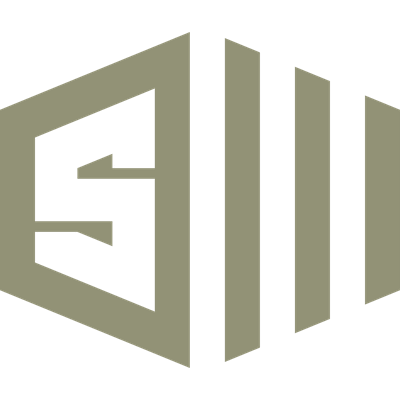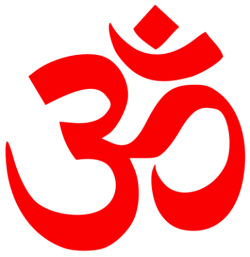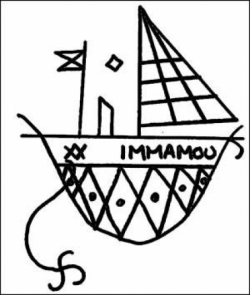What's the meaning of the Swastika Symbol »
Swastika Symbol
This page is about the meaning, origin and characteristic of the symbol, emblem, seal, sign, logo or flag: Swastika Symbol.

The swastika (from Sanskrit svástika) is an equilateral cross with its arms bent at right angles, in either right-facing form or its mirrored left-facing form. Archaeological evidence of swastika-shaped ornaments have been dated to the Neolithic period and was first found in the Indus Valley Civilization of the Indian Subcontinent. It occurs today mainly in the modern day culture of northern India, sometimes as a geometrical motif and sometimes as a religious symbol.
In Hinduism, the two symbols represent the two forms of the creator god Brahma: facing right it represents the evolution of the universe (Devanagari: प्रवृत्ति, Pravritti), facing left it represents the involution of the universe (Devanagari: निवृत्ति, Nivritti). It is also seen as pointing in all four directions (north, east, south and west) and thus signifies a grounded stability. Its use as a Sun symbol can first be seen in its representation of the god Surya (Devanagari: सूर्य, Sun). The swastika is considered extremely holy and auspicious by all Hindus, and is regularly used to decorate items related to Hindu culture. It is used in all Hindu yantras (Devanagari: यंत्र) and religious designs. Throughout the subcontinent of India, it can be seen on the sides of temples, religious scriptures, gift items, and letterheads. The Hindu deity Ganesh (Devanagari: गणे
The earliest archaeological evidence of swastika-shaped ornaments dates back to the Indus Valley Civilization as well as the Mediterranean Classical Antiquity. Swastikas have also been used in various other ancient civilizations around the world including China, Japan, India, and Southern Europe. It remains widely used in Indian religions, specifically in Hinduism, Buddhism, and Jainism, primarily as a tantric symbol to evoke shakti or the sacred symbol of auspiciousness. The word "swastika" comes from the Sanskrit svastika - "su" meaning "good" or "auspicious," "asti" meaning "to be," and "ka" as a suffix. The swastika literally means "to be good". Or another translation can be made: "swa" is "higher self", "asti" meaning "being", and "ka" as a suffix, so the translation can be interpreted as "being with higher self". The symbol has a long history in Europe reaching back to antiquity. In modern times, following a brief surge of popularity as a good luck symbol in Western culture, a swastika was adopted as a symbol of the Nazi Party of Germany in 1920, who used the swastika as a symbol of the Aryan race. After Adolf Hitler came to power in 1933, a right-facing 45° rotated swastika was incorporated into the Nazi party flag, which was made the state flag of Germany during Nazism. Hence, the swastika has become strongly associated with Nazism and related concepts such as antisemitism, hate, violence, death, and murder in many countries, and is now largely stigmatized there due to the changed connotations of the symbol. Notably, it has been outlawed in Germany and other countries if used as a symbol of Nazism in certain instances . Many modern political extremists and Neo-Nazi groups such as the Russian National Unity use stylized swastikas or similar symbols.
- 3,086 Views
Graphical characteristics:
Asymmetric, Open shape, Monochrome, Contains straight lines, Has crossing lines.
Category: Religious Symbols.
Swastika Symbol is part of the Hindu Symbols group.
More symbols in Hindu Symbols:

More symbols in Religious Symbols:
Religious symbolism is the use of symbols, including archetypes, acts, artwork, events, or natural phenomena, by a religion. Religions view religious texts, rituals, and works of art as symbols of co… read more »
Citation
Use the citation below to add this symbol to your bibliography:
Style:MLAChicagoAPA
"Swastika Symbol." Symbols.com. STANDS4 LLC, 2025. Web. 26 Jan. 2025. <https://www.symbols.com/symbol/swastika-symbol>.
















Have a discussion about Swastika Symbol with the community:
Report Comment
We're doing our best to make sure our content is useful, accurate and safe.
If by any chance you spot an inappropriate comment while navigating through our website please use this form to let us know, and we'll take care of it shortly.
Attachment
You need to be logged in to favorite.
Log In